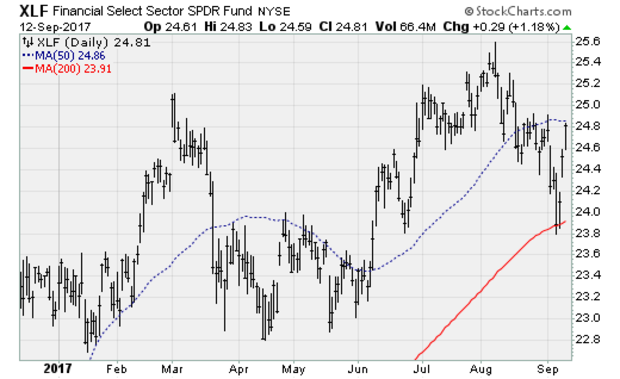The sudden flip in investor sentiment
For weeks, Wall Street was in a trance. Investors were gripped by fears about hurricanes, North Korean missiles, political dysfunction and possible monetary policy tightening from the Federal Reserve. Stocks didn't move much overall, but they sure suffered a number of harrowing one-day sell-offs.
Suddenly, these fears have now melted away, helping the Dow Jones industrials index push to new record closing highs on Monday and again on Tuesday. President Donald Trump inked a quick and surprising debt ceiling deal with Democrats. The "fire and fury" rhetoric Mr. Trump used against North Korea has since toned down. Hurricanes Irma and Harvey, while deadly, are fading from the broader public's psyche.
Instead, it's all about the new Apple (AAPL) iPhone X, rising median incomes and the ongoing tightening of the job market, as indicated by the rising number of jobs employers haven't filled. Consumer sentiment is high, as are corporate earnings expectations. And U.S. home prices have never been higher.
It's like investors have suddenly awoke from a nightmare and remembered they're in Disneyland with pockets full of money. And immediately called their brokers.
Technical factors are in play as well. Specifically, focusing on the financial sector, which dropped frighteningly hard last week and pushed the Financial Select SPDR
(XLF) down to test its 200-day moving average (red line in chart above). This key level of long-term trend hadn't been touched since the summer of 2016, and it risked calling into question the post-election uptrend.
But then, as if by magic, buyers have swooped in and pushed the XLF back up toward its 50-day moving average (blue line in chart above). That was made more impressive by the negative headlines coming out of the big banks.
Outside of Apple, the other big news of the day on Tuesday were the trading revenue takedowns from Wall Street executives. JPMorgan (JPM) CEO Jamie Dimon -- when not railing against bitcoin -- said trading revenue would be down around 20 percent and that the bank may no longer give intra-quarter trading guidance in the future. That's not a good sign.
Later in the day, Bank of America (BAC) officials said third-quarter trading revenue would be down by 15 percent. And this followed comments from Citigroup (C) that trading revenue would be down 15 percent year-over-year and 5 percent sequentially.
Although stock futures are down a tick on Wednesday morning, investors seem to be mostly ignoring all that noise. They're focusing instead on a rally in long-term interest rates, which would lift bank earnings expectations on higher net interest margin hopes.
A surge in yields is needed, and it could be signaling a rebound in GDP growth and inflation. But it will weighs on other assets because higher interest rates will have a wet-blanket effect on the rest of the economy if it accelerates out of control.
Also keep in mind that seasonality is very negative in September and that the Dow's surge to new highs came on Monday, with its best one-day jump in six months. The last two times that happened, according to the folks at SentimenTrader, were the bull market tops in 2000 and 2007.





